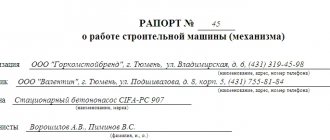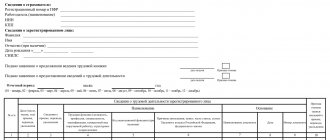Sample job description for agronomist
General provisions
- An employee working as an agronomist is classified as a specialist.
- An agronomist must have a higher education in his specialty and a work experience of at least 3 years, or a secondary specialized education with a work experience in this position of at least 5 years.
- Agrom appoints and dismisses _____________________.
- When performing his work, the agronomist relies on the current regulatory and technical papers, the charter and local regulations of the business entity, this document.
- An employee hired for the position of agronomist needs to know:
- legislative acts, documentation of the organization or other bodies related to issues of agricultural production and the activities of its structural unit;
- technological procedures for agricultural production and leading experience in the field of agro-industry;
- methods of carrying out scientific research in the field of agronomy;
- methods of growing field, garden and vegetable crops;
- basics of entomology, toxicology, phytopathology;
- types of soils and their characteristics;
- basic information in the field of economics, production management in their field, labor legislation, including in terms of remuneration, methods of labor regulation, material and moral incentives;
- content of normative acts of land legislation;
- internal labor regulations;
- standards of labor protection at the enterprise, environmental protection, safety precautions, sanitation at work, fire protection.
- During the absence of an employee (as a result of vacation, illness or business travel), his job functions are assumed by an employee appointed by management. All the powers of the agronomist are delegated to him, and he will be responsible for the unfair solution of work tasks.
Job responsibilities
An agronomist’s job responsibilities include the following:
- Conducting some scientific research in your area of activity.
- Studying and introducing new methods of working with field, garden, flower and garden crops at your enterprise.
- Development and improvement, as well as the introduction of technologies to combat diseases and pests of crops, weeds.
- Planning and working on agrotechnical measures to improve soil fertility and increase crop yields.
- Creation of production plans by type and quantity of plants.
- Contacts with suppliers of seeds, fertilizers, seedlings.
- Preparation of contracts for the purchase of the above objects.
- Organization of work on growing modern high-quality crops, planting and seed funds and participation in this work.
- Organization of activities to prepare the soil for sowing and planting work.
- Organization of work on the creation and application of fertilizers and fertilizing to the soil.
- Control of the preparation of seeds and seedlings.
- Organization of sowing of field plants.
- Formation of schedules for caring for planted crops.
- Control over the collection, transportation to storage and storage of the harvest received during the season.
- Formation of scientific documentation and related reports and estimates.
- Management of subordinate employees.
- Training of subordinate personnel.
Rights
An employee hired as an agronomist has the following rights in the organization:
- Have information about the employer’s draft decisions related to the agronomist’s field of activity.
- Offer managers activities to improve work in their area. Labor tasks are described in this instruction.
- Within the scope of their competence, inform immediate superiors about detected shortcomings in the organization’s work and propose measures to eliminate them.
- Have access to all information and documents necessary to perform your job functions.
- Involve employees of other departments in performing the functions assigned to the agronomist, with the consent of management.
- Request help from managers to solve work problems.
- Improve your own professional qualifications.
Responsibility
During the performance of his duties, the agronomist bears the following responsibilities:
- for insufficient performance or failure to fulfill one’s labor duties - in accordance with the limits established by the current labor legislation of the Russian Federation;
- for misconduct during their work - in accordance with the provisions of the Code of Administrative Offenses of the Russian Federation, the Criminal Code of the Russian Federation, and the Civil Code of the Russian Federation.
- for causing material damage - in accordance with the Labor Code of the Russian Federation and the Civil Code of the Russian Federation.
History of the profession
Man has been cultivating the land since ancient times. The population of China, Vietnam, India, the countries of southern Europe and Latin America, thousands of years ago, learned to properly cultivate the land and grow agricultural plants. With the formation of states and the development of the entire human civilization, the science of agronomy appeared: it is designed to ensure the development and maintenance of the food industry. Special methods and techniques help to obtain the planned harvest at the end of the season.
Before the advent of writing, knowledge of agronomy was passed on from older generations to younger ones. The first agronomists were the ancient Slavs. And in our country, A.T. became experts in this matter. Bolotov, I.M. Komov. Scientists V.V. contributed invaluable knowledge to agronomy with their research. Dokuchaev, K.A. Timiryazev, D.N. Pryanishnikov, I.V. Michurin. The results of their work are used by current workers in this profession to this day.
Justification for the need for a job description
The job description at the enterprise helps to solve the following tasks:
- specific formulations of requirements for education, seniority of personnel, job descriptions; the employer does not have to explain what the employee must do - you can simply familiarize him with the document;
- reasoning for refusing to accept an applicant for a given position if for some reasons he is not suitable;
- justify the legality of disciplinary action if the employee committed an offense in the workplace or did not perform his tasks well enough;
- differentiation of labor responsibilities between several identical staff units;
- approve limits of liability for employees.
After reading the job description, the employee should have no questions for the employer about the scope of his responsibilities in this organization.
Important! The document can be drawn up as an annex to the employment contract, or it can be approved as a separate document in the local regulations of the business entity.
Pros and cons of the profession
The advantages of being an agronomist include:
- the work is not monotonous, you always have to solve different problems;
- the profession is highly in demand in the labor market and significant for society;
- This specialist spends a lot of time outdoors.
The disadvantages of this profession are the following:
- working conditions are not always favorable (you have to come into contact with chemical plant protection products, treated fertilizers and seeds; dust in granaries, during the operation of tractors, combines);
- partial and sometimes complete dependence of work results on natural and climatic conditions in the fields;
- low salaries, which is typical for many agricultural specialists;
- The salary amount is most often fixed and does not depend on the quality of work;
- Some organizations require agronomists to disrupt technological processes to achieve maximum yield;
- irregular working hours (it is normal to work seven days a week or 12–14 hours a day);
What and how to write in a document
The document is drawn up in free form, since there are no legal requirements for this issue. The job description includes basic and additional parts. The latter include “Working Conditions”, “Relationships”, etc. The sections related to the main ones will be discussed below.
General provisions
In this part, management should note the requirements for education and work experience of an agronomist, to whom the employee reports, what legislative documents he must study, and the algorithm for appointment to the position. The work tasks are not described in detail here, only general points. There is a separate section for functions.
Job responsibilities
To compose this section, you can use the text of the professional standard “Agronomist”, approved by order of the Ministry of Labor of the Russian Federation dated July 9, 2020 No. 454n. From it you can write out the tasks that an employee will have to solve in a particular organization. The volume will depend on the size of the business entity, as well as on the availability of other similar staffing units between which some responsibilities can be divided.
This point needs to be written as specifically as possible so that the employee immediately understands what he will do in the workplace. It is important that the tasks listed correspond to the skills and knowledge noted in the first section of the document.
Rights
A point that notes what powers the agronomist has when solving work problems. They usually write that this is the right to receive all the necessary documentation and information, to receive assistance in the work of other employees and management, and to participate in the life of the organization. This section is also quite general; in some cases it includes any specific rights depending on the specific tasks of the employee.
Responsibility
The responsibility of an agronomist at his workplace is prescribed only in general terms, since each offense is examined individually and the decision on punishment comes depending on it. Usually they only indicate that disciplinary, material, administrative and criminal liability is imposed in the order established in the current Labor Code of the Russian Federation, the Criminal Code of the Russian Federation, and the Code of Administrative Offenses of the Russian Federation.
Our assessment of the profession
6.6
Demand
8.0/10
Salary
5.0/10
Is it easy to get a profession?
7.0/10
Kudos
6.0/10
Career
7.0/10
The profession of an agronomist is one of the most significant in agriculture. This person directly manages the process of growing a wide variety of crops. He selects methods of cultivation and soil reclamation, interacts with workers and independently makes decisions in order to obtain the maximum amount of harvest.
For a number of reasons, there are always more vacant positions in this profession than there are applicants. However, this creative and diverse work aims, in essence, to satisfy the basic need of all people for food. Yes, the harvest largely depends on agronomists. And most of the products that people eat every day were created by these specialists. Agronomists know exactly when and how to plant crops, what fertilizers are needed, how to protect themselves from pests and maintain the required yield levels.
How to write a job description
The job description is created on A4 paper with the logo and details of the enterprise. The document should be formatted as follows:
- First comes information about the organization (its name and details).
- Then the columns are placed for approval by the employer. Here the manager signs and indicates the date of approval of the document.
- This is followed by the title of the document and the text itself.
- At the end of the paper, the agronomist, his manager and those approving the job description put their signatures.
The drawing up of instructions is usually carried out by personnel workers, lawyers, and the agronomist’s immediate supervisors are involved. If the staff is small, then the employer himself deals with this matter.
Important to remember! The instructions are usually prepared in duplicate. Management keeps one of them; it can be kept in the HR department. The other is kept by the employee. An agronomist can keep it at his workplace in his office so that he can always clarify his job responsibilities.
Where can an agronomist work?
An agronomist can work in such organizations as:
- farms;
- specialized research institutes and educational institutions;
- agricultural firms.
The work of an agronomist is year-round, with particularly high employment during the sowing and harvesting campaign. A specialist’s working day often begins at sunrise and continues until late at night. In addition, most of the time is spent traveling around the fields to monitor work on site.









